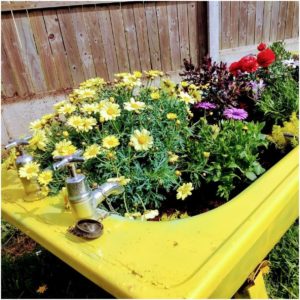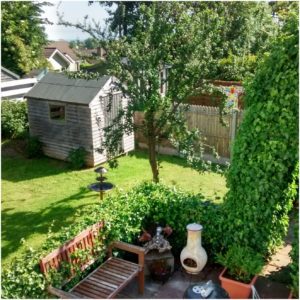Rural rules! Trendy Concepts for Rural Living
Swapping City for Country Life
Like many people on the verge of starting a family, we swapped our cramped apartment in Dublin City for a more spacious and rural alternative in Co. Wicklow. Sometimes we still can’t believe how lucky we were finding our perfect family home after just one viewing. The house itself and also its location in the gorgeous seaside seaside town of Greystones offers everything we had been looking for.
We didn’t exactly acquire a farm, but my husband John likes growing vegetables in the sizable wrap around garden. I love my herbal and lavender bed as well as our little orchard which bears gorgeous fruit every year and gives shade on sunny days. The kids have plenty of space for activities and their own little playground. Since we bought chickens just before Easter this year, I fondly call it our Payne FARMily.



Greystones – Not so rural anymore
Unfortunately the construction of housing estates in Greystones has grown exponentially in recent years. When we first viewed our house in summer 2016, there were only a few new developments around. All within reason for a popular and attractive area like Greystones. But ever since, developments have exploded, not taking the limited infrastructure into account at all. To my regret it doesn’t feel as rural anymore as we had hoped for when we moved here.
However we still value all the amenities close by. Our house and garden is like a little green, self-contained island where we can enjoy privacy and tranquility without feeling claustrophobic. All the more during the times of a full Corona lockdown. We are thankful that we get to combine the best of both worlds – lively Greystones and the beautiful Irish countryside and sea at our doorstep.
And whilst Ireland is the destination embodying tranquility and re-connection with nature for many Germans, I turned to Germany for some pretty interesting trends emerging around rural living.
Longing for Land
According to a study, about 41% of the Germans could imagine switching their urban setting for a more rural one. Especially during the pandemic, as the proximity to the work place has become redundant, more people take advantage of their newly gained flexibility and flee the packed cities in favour of rural living.
Even before the pandemic the image of country life was already changing. It is no longer seen as outdated lifestyle between boring fields and smelly cow stables. Therefore house prices in rural areas in Germany have been increasing by 40 % in the past 4 years. It used to be the expensive and little supply of living space that forced young people out of the cities. Now more people choose rural living, hoping for a higher-quality family life. (Source: German Documentary “Out of the City – The Dream of Rural Living” [Titel translated])
Rural Living on Trial with “Coconat“
Committing to buying your own property far out in the countryside can still be a challenge despite working from home. Limited accessibility, none or little public transport and usually few facilities nearby – to name a few. Coconat, about an hour South-West of Berlin, is a great project to live in the countryside ‘on trial‘. “It is perfect to get a feel for country life“, Svenja Nette, a 35-years old blogger says to the ZDF (German TV station). „Am I made for country life and is the country life made for me“, she continues. That is what you can find out as a guest on the expansive former country estate in Klein Glien.

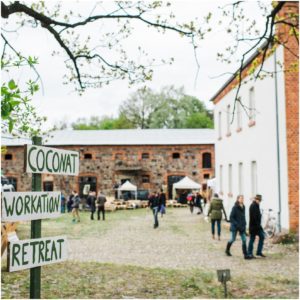
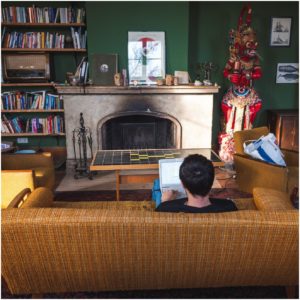
 © 1: Coconat, 2 & 4: Tilman Vogler, 3: Andreas Plata
© 1: Coconat, 2 & 4: Tilman Vogler, 3: Andreas Plata
Klein Glien is a tiny village with not more than 80 residents in the federal state of Brandenburg (surrounding Berlin). Here Coconat offers co-working and living space for young professionals, mostly coming from the nearby capital of Berlin at the moment. Instead of living or working by themselves in a single household, they can join a group of like-minded people from different backgrounds.
In the community area – a huge converted barn – the guests can socialise, share ideas or enjoy the peaceful surroundings on their own. Some only stay for 1 night to work on an assignment. Others book in for weeks or even months, working and contributing to the community in multiple ways. Apart from looking after their guests, the 3 founders Julianne Becker, Janosch Dietrich and Iris Wolf make sure that the locals are kept in the loop too. “It was important to us to respect the views of the people in Klein Glien and that they accept us in return”, says Julianne. The annual village festival, for example, is now hosted on the estate. A fantastic gain for everybody since the estate had been deserted and hence unused for many years beforehand.
Upcycling Big Style – “Your Year in Loitz“
Annika and Rolando, a creative couple from Berlin, have recently moved into an abandoned house in Loitz in Mecklenburg Vorpommern in the North of Germany. With that they have taken on a hell of a project. Namely to convert a big, empty shell into a livable space and to add value for the local community. Annika and Venezuelan native Rolando are full of innovative ideas and have a vision to make it work. After all they have been chosen out of 93 applicants when Loitz got the funding for ‘The City of Future 2030’. The town residents then elected the couple from the 17 finalists to join their community.
Beating Berlin and Freiburg which had also applied for ‘The City of Future 2030’, was a great win for the 4300-resident town of Loitz. From the funding Annika and Rolando receive a monthly base income of €1000 for a year and rent-free living in order to brush up the image of the infrastructurally weak region. The idea behind it is to make living in a remote area more attractive again for young people. Hence, rather than young people benefiting from the countryside, it is the other way around in this case.
Annika and Rolando have a year to put their concept which won over the jury into reality. Supported by ambitious neighbours and volunteers and with their creative ideas and skills they are to transform their temporary home into a vital communal space. With that they hopefully will create a win-win situation even beyond the scope of the project. A fantastic initiative that could also help to awaken some rural Irish towns from their slumber.
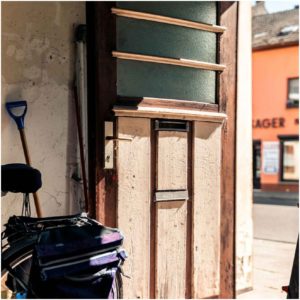

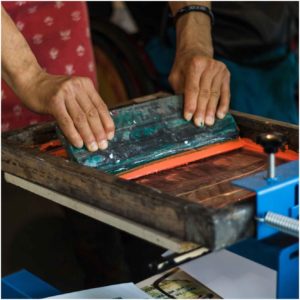
 © Dein Jahr in Loitz; 1, 2 & 4: Matthias Marx
© Dein Jahr in Loitz; 1, 2 & 4: Matthias Marx
“It takes a Village to raise a Child“
Not only where people live, but also how they live seems to be undergoing a shift towards traditional ways of living. When I asked my friend Julia why she was giving up her convenient city centre apartment in Hamburg to move to a multiple generation living space about 160km further North, she says: “It takes a village to raise a child. And that is my hope for our new home in ‘Freiland Flensburg‘.“ Julia is a single mother with a 5-year old daughter. Living and working in Hamburg has suited her in the past years. “Now it is time to move on“, she tells me. “My grandad was originally from Flensburg. Maybe it is a sign that we found exactly there what we were looking for.“
‘Freiland Flensburg‘ is a campus close to the city centre of Flensburg containing different forms of residential spaces. It includes apartments for single households, different size houses for couples and families, as well accessible units for senior citizens. The main building provides communal space such as guest rooms, a kitchen, a roof terrace and an atrium in the centre. The idea is to offer support for everybody who wants (or needs it) and to profit from the vast skills set of the variety of residents.
“I won‘t need to worry anymore when my daughter is playing outside“, Julia says. “There are always going to be other kids around. Or I can drop her off with a neighbour when I have to run a quick errand or work.“ Julia on the other hand could offer support in digital matters to elderly people, or teach students how to use a sewing machine. Her baking is fantastic too. I am sure her fellow residents are going to profit from that. A great traditional barter system in a modern environment.
Allotment Garden Irish Style
Rural living without a garden doesn‘t really go together for me. What I observe in Greystones however is that most new builds go for an extended indoor space over a green outdoor area. If people have a garden, they often manicure it to perfection or pave it altogether. Not exactly my idea of a natural recreation space.
With joy I read about Tírmór Allotments in Newcastle, Co. Wicklow in the Greystone Guide recently. “The project is to lay a foundation for an agroforestry project“, says founder Huw. He also runs the Co-working space Hub13 that is currently on hold due to Covid 19. “Tírmór allotments is all about increased biodiversity and soil quality“, Huw continues, “and how farming used to be done before we thought we could cheat nature. Construction impacts can lead to increased flooding and I am planning to counteract negative side effects like that by going back to the roots.“
Aimed to be completed within the next 5 years, Huw is converting parts of the 150 year old family farm just outside Newtownmountkennedy into allotments of various sizes. “In combination with the work hubs, people can spend their lunch break planting their own veg“, Huw says with a smile. A fantastic solution for people who prefer a low maintenance garden attached to their house, but would like to give home growing a shot anyway. Cooking and eating it on spot won‘t be too far fetched either as Huw is planning an outdoor kitchen and campsite along with it. The perfect outdoor adventure for hobby gardeners big and small!
Less is More
Above living concepts show that the wheel doesn‘t have to be re-invented. We can absolutely learn from what generations before us did well or even take a peek at other countries. By just giving it a modern twist, it can turn into something innovative and sustainable.
When I was a teenager I didn’t appreciate rural living nor did I see myself settling in the Irish countryside. The older I get, the more I learn to value traditional concepts of living. I enjoy home growing and cooking food from scratch. I think it is intrinsic wanting to provide for your family. It also is very satisfying creating something with your own hands. I enjoy showing our kids how things grow and what you can make out of them. Moreover I am amazed how little we actually need for a happy life. Here is to rural living!

